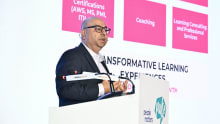Wondering how to create safe AI learning space for employees? Genpact's CHRO shares best practices

In an era characterised by rapid technological advancements, traditional approaches to employee training are being supplanted by cutting-edge methodologies. The emergence of virtual reality (VR), artificial intelligence (AI), and machine learning (ML) has revolutionised the learning landscape, offering unparalleled opportunities for growth and development.
According to a study by GlobeNewswire, the global corporate training market is poised to exceed $493.32 billion by 2028, underlining the pivotal role of technology in driving organisational success. From immersive VR simulations to AI-driven personalised learning experiences, these innovations empower employees to acquire new skills and knowledge anytime, anywhere, transcending geographical constraints and fostering a globally connected workforce.
Over the past decade, VR training surged in popularity, with advancements in VR technologies and widespread adoption of VR headsets enhancing the training experience. Similarly, AI and ML have gained traction, providing tailored learning recommendations based on individual progress and learning history. This personalised approach not only enhances the effectiveness of training but also optimises resource utilisation.
Moreover, the proliferation of online learning platforms and mobile devices has democratised access to training materials, offering unparalleled convenience and flexibility. Blended learning, which combines traditional and modern methodologies, has emerged as a preferred approach, offering a holistic learning experience. However, amidst these advancements, leaders often grapple with concerns about overwhelming employees with rapid upskilling, ensuring security, and facilitating a smooth transition to an AI-first workplace.
If you're facing similar doubts, we're here to help. In an exclusive interview with People Matters, Piyush Mehta, CHRO at Genpact, addressed these concerns and discussed the integration of generative AI (GAI) in the workplace, emphasising the importance of clarity and transparency around its usage, navigating the complexities of AI-enabled learning, and much more.
Excerpts from the interview:
Employees may feel overwhelmed by the vast number of granular skills and domains available? How does Genpact ensure that the learning process remains manageable and effective?
As a global professional services firm, we are as good as the talent we have. Our employees are front and centre of what we do and are efficiently enabled to deliver flawlessly on evolving client priorities. We believe that our path to client innovation and talent engagement hinges on being a forever curious and learning organisation where people are empowered to improve their skills and be directed toward the most effective place to deliver and collaborate effectively at scale.
To continuously upskill our employees in today’s rapidly changing world, we use Genome, our AI-assisted scalable learning platform to learn and build “skills of the future”. It offers over 600 granular skills in over 80 domains and learning across four major areas - digital skills, professional skills, industry skills, and service lines skills. The platform creates a personalised learning plans to guide employees on critical skills to focus on, based on their roles, to track all relevant skills without overwhelming the learner. So far, our employees have completed over 40M learning hours on Genome.
How does Genpact plan to address the potential challenges of constantly evolving technologies and the risk of employees' skills becoming outdated in this fast-paced digital landscape?
At Genpact, we continue to invest in and identify ways to integrate data, technology and AI to upskill and reskill our employees, to help them build career resilience in a changing world and continue driving impact for our clients. Through Genome, our employees are able to build critical, future-ready skills, including data analytics, AI and generative AI among others. An example of the speed and scale at which we are able to make learning new digital skill available on Genome is the way we launched Generative AI as a skill within just 3 weeks of identifying the need. Currently, over 100,000 of our employees are learning Generative AI skill at beginner level and more than 60,000 have built foundational capability.
Genome has over 50,000 active learners every month and over 600 subject matter experts or “master gurus” – Genpact leaders with over 20 years of experience who curate various courses on the platform and update content as per changing industry trends. To scale it further, we also rolled out a generative AI-powered bot, AI Guru, as a digital twin of all the master gurus collectively, available around the clock.
We even have specific programs like Databridge and Techbridge that are focused just on elevating the technical and data literacy of our employees, needed to thrive in this fast-paced digital world. We’ve trained more than 70,000 employees globally over the past three years through our Databridge program, and more than 90,000 people are actively learning through Techbridge.
How does Genpact ensure that employees see AI as an ally in their learning journey rather than a potential threat to job security?
Building an AI-first workplace requires robust change management and upskilling, especially as employees are grappling with concerns about job security. We believe that AI will empower workers and open doors to new career opportunities, allowing them to augment their unique skills and abilities.
AI will provide new superpowers to people by augmenting and accelerating what they do and will allow them to focus on tasks which need critical thinking and collaboration with machine doing more repetitive and tedious work.
To champion adoption, keeping humans-in-the-loop and combining people and AI will be key to drive change and increase productivity. It is important to create an environment for employees to feel safe and motivated to learn and engage with emerging AI technologies to thrive in a competitive landscape.
For us, cultivating a strong people-first culture of trust, collaboration, and continuous learning is key to effectively engaging employees, while ensuring business continuity as well as future organisational success in today’s AI-driven.
You can also read:
- Genpact: Leading through uncertain times
- Dream in digital, dare in reality: Piyush Mehta, CHRO, Genpact
- How Genpact achieved a "Gender-Balanced" workplace
There's a growing concern about the potential data privacy issues related to employees' learning activities. Can you share how Genpact safeguards the privacy and confidentiality of its employees' learning data in the digital age?
At Genpact, we follow the General Data Protection Regulation (GDPR) policy, for our employees in Europe, according to which everyone responsible for using personal data has to follow strict 'data protection principles' under the Data Protection Act 2018 in the UK. For other regions, we comply with data privacy and security guidelines in accordance with their local laws.
For instance, all Genome data about our employees is considered personal data/personal identifiable information. When granting access or when disclosing any Genome data, learning teams are reminded to consider:
- Proportionality and necessity: Access to learning Data should only be granted to people who are authorised to receive it and who have a legitimate business purpose to use the data.
- Data minimisation: Access should be limited to what information is necessary for achieving the intended business purpose and should only be disclosed to the individuals who will actually use it (e.g. no distribution lists or bulk emails).
- Security and confidentiality: Learning Data are most secure when it stays within the Genome platform, but sometimes you may need to download (or receive) extracts or spreadsheets containing Genome Data. When disclosing learning Data via email or other means of communication, use password-protected files and check that you are only sending to authorized recipients. Send the password in a separate email or chat. The files which are downloaded should be deleted as soon as the information is not necessary anymore.
- Periodic reviews of access and disclosures: Reviews should be conducted on a regular basis, at least quarterly, to ensure that individuals having access to learningData, in accordance with this procedure, are still authorised to receive and/or access such data. This shall include reviews of any mailing lists and/or shared workspaces used to disclose Genome Data.
- Anonymisation of learning Data in reports: If you are disclosing Genome Data to large audiences, in the form of reports, you should provide the information in aggregated form, excluding any individual level data. There may be times that members of senior management require individual level data for a large number of employees for legitimate purposes.
- Retention of Genome Data: Genome Data outside of the Genome platform—for example, that you receive via email—should be deleted as soon as the intended business purpose has been achieved. Do not store Genome Data on your desktop, personal OneDrive folder, email inbox, or other locations beyond what is necessary to achieve the intended business purpose.
With Genpact's strong emphasis on continuous learning, some may argue that it inadvertently creates a culture of job insecurity, where employees must continually prove their worth through new skills. How does Genpact balance the push for learning with job stability and security for its workforce?
As I mentioned earlier, our cultural framework allows us to build trust, empathy, and engage 125,000+ employees in over 30 countries, in which we operate. It encourages our people to lead change by being curious, incisive, and courageous while championing integrity and inclusivity. Our focus has been about giving our people an opportunity to continuously learn and grow and this access to learning in fact helps in job security as employees are constantly guided to reskill to stay relevant in the future.
We’re leveraging our redeployment automation platform, TalentMatch, to match the skills and job aspirations of our employees with existing and future job opportunities at Genpact, and help them build strong, rewarding careers within the company.
We’ve also realised that being able to have a real-time pulse check on employees is definitive in today’s ever evolving environment to support employees and instil a sense of safety and security. We use our AI-powered chatbot, Amber to keep a real-time pulse on employee sentiment and mood, which impacts the company’s culture tremendously. Amber reaches out to employees at key milestones of their journey with Genpact to capture their feedback and shares all this data with business and HR leaders to proactively address employee concerns.
To encourage collaboration, networking, and community building, we’re using Watercooler, a first-of-its kind virtual assistant, that we’ve created in partnership with Microsoft. It takes charge of seamlessly scheduling quick, informal one-on-one encounters with colleagues in the Genpact network at convenient times. With Watercooler, we’re building in serendipity, fuelling spontaneous creativity, knowledge-sharing, and cultural formation amongst employees.









